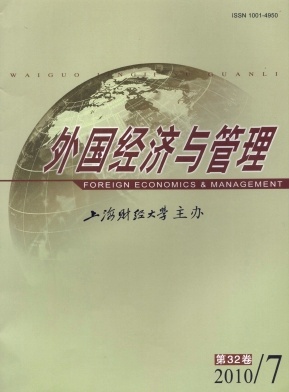基于调节焦点理论的领导对下属影响机制研究
外国经济与管理 2010 年 第 32 卷第 07 期, 页码:49 - 56
摘要
参考文献
摘要
本文把当前动机研究前沿——调节焦点理论应用于领导影响机制研究,试图揭示领导通过引导下属调节焦点来影响下属态度及行为的作用机制。本文首先介绍了调节焦点理论及其在领导研究领域的应用情况;然后通过对前人观点的整合构建了一个基于调节焦点理论的领导影响力模型;接下来,借助这一模型,系统地探讨了领导通过行为示范、语言和符号的使用和反馈来引导下属调节焦点从而影响下属的过程,以及由于领导对下属促进型/防御型调节焦点的激发而可能导致的下属不同态度及行为结果。
[1]Bass,B M.Leadership and performance beyond expectation[M].New York:Free Press,1985.
[2]Graen,G B,and Uhl-Bien,M.Development of leader-member exchange(LMX)theory of leadership over 25 years:Applying amulti-level multi-domain perspective[J].Leadership Quarterly,1995,6:219-247.
[3]Shamir,B,House,RJ,and Arthur,MB.The motivational effects of charismatic leadership:Aself-concept based theory[J].Organization Science,1993,4(4):577-594.
[4]Kark,R,and Van Dijk,D V.Motivationtolead,motivationtofollow:The role of the self-regulatoryfocusinleadership proces-ses[J].Academy of Management Review,2007,32(2):500-528.
[5]Higgins,E T.Beyond pleasure and pain[J].American Psychologist,1997,52(12):1 280-1 300.
[6]Higgins,E T.Promotion and prevention:Regulatory focus as a motivational principle[A].in MP Zanna(Ed.).Advances in ex-peri mental social psychology(vol.30)[C].New York,NY:Academic Press,1998:1-46.
[7]Brockner,E,and Higgins,E T.Regulatory focus theory i mplications for the study of emotions at work[J].Organizational Be-havior and Human Decision Processes,2001,86(1):35-66.
[8]Crowe,E,and Higgins,E T.Regulatory focus and strategic inclinations:Promotion and prevention in decision-making[J].Or-ganizational Behavior and Human Decision Processes,1997,69(2):117-132.
[9]Friedman,R S,and F rster,J.The effects of promotion and prevention cues on creativity[J].Journal of Personality and SocialPsychology,2001,81(6):1 001-1 013.
[10]Kluger,A N,Stephan,E,Ganzach,Y,and Hershkovitz,M.The effect of regulatory focus on the shape of probability-weigh-ting function:Evidence from a cross modality matching method[J].Organizational Behavior and Human Decision Processes,2004,95(1):20-39.
[11]Van Dijk,D,and Kluger,A N.Feedback sign effect on motivation:Is it moderated by regulatory focus[J].Applied Psychol-ogy:An International Review,2004,53(1):113-135.
[12]Levontin,L,Kluger,A,and Van Dijk,D.Goal-orientation theory and regulatory-focus theory:The“conflicting”effects offeedback-sign[R].Working Paper,Hebrew University of Jerusalem,2004.
[13]Roney,C J R,Higgins,E T,and Shah,J.Goals and framing:Howoutcome focus influences motivation and emotion[J].Per-sonality and Social Psychology Bulletin,1995,21(11):1 151-1 160.
[14]Lord,R G,and Brown,D J.Leadership processes and follower identity[M].Mahwah,NJ:Lawrence Erlbaum Associates,2004.
[15]Lockwood,P,Jordan,C H,and Kunda,Z.Motivation by positive or negative role models:Regulatory focus determines whowill best inspire us[J].Journal of Personality and Social Psychology,2002,83(4):854-864.
[16]Idson,L C,and Higgins,E T.Howcurrent feedback and chronic effectiveness influence motivation:Everything to gain versuseverything to lose[J].European Journal of Social Psychology,2000,30(4):583-592.
[17]Watson,D,Wiese,D,Vaidya,J,and Tellegen,A.The two general activation systems of affect:Structural findings,evolu-tionary considerations,and psychobiological evidence[J].Journal of Personality and Social Psychology,1999,76(5):820-838.
[18]Frster,J,Grant,H,Idson,L C,and Higgins,E T.Success/failure feedback,expectancies,and approach/avoidance motiva-tion:Howregulatory focus moderates classic relations[J].Journal of Experi mental Social Psychology,2001,37(3):253-260.
[2]Graen,G B,and Uhl-Bien,M.Development of leader-member exchange(LMX)theory of leadership over 25 years:Applying amulti-level multi-domain perspective[J].Leadership Quarterly,1995,6:219-247.
[3]Shamir,B,House,RJ,and Arthur,MB.The motivational effects of charismatic leadership:Aself-concept based theory[J].Organization Science,1993,4(4):577-594.
[4]Kark,R,and Van Dijk,D V.Motivationtolead,motivationtofollow:The role of the self-regulatoryfocusinleadership proces-ses[J].Academy of Management Review,2007,32(2):500-528.
[5]Higgins,E T.Beyond pleasure and pain[J].American Psychologist,1997,52(12):1 280-1 300.
[6]Higgins,E T.Promotion and prevention:Regulatory focus as a motivational principle[A].in MP Zanna(Ed.).Advances in ex-peri mental social psychology(vol.30)[C].New York,NY:Academic Press,1998:1-46.
[7]Brockner,E,and Higgins,E T.Regulatory focus theory i mplications for the study of emotions at work[J].Organizational Be-havior and Human Decision Processes,2001,86(1):35-66.
[8]Crowe,E,and Higgins,E T.Regulatory focus and strategic inclinations:Promotion and prevention in decision-making[J].Or-ganizational Behavior and Human Decision Processes,1997,69(2):117-132.
[9]Friedman,R S,and F rster,J.The effects of promotion and prevention cues on creativity[J].Journal of Personality and SocialPsychology,2001,81(6):1 001-1 013.
[10]Kluger,A N,Stephan,E,Ganzach,Y,and Hershkovitz,M.The effect of regulatory focus on the shape of probability-weigh-ting function:Evidence from a cross modality matching method[J].Organizational Behavior and Human Decision Processes,2004,95(1):20-39.
[11]Van Dijk,D,and Kluger,A N.Feedback sign effect on motivation:Is it moderated by regulatory focus[J].Applied Psychol-ogy:An International Review,2004,53(1):113-135.
[12]Levontin,L,Kluger,A,and Van Dijk,D.Goal-orientation theory and regulatory-focus theory:The“conflicting”effects offeedback-sign[R].Working Paper,Hebrew University of Jerusalem,2004.
[13]Roney,C J R,Higgins,E T,and Shah,J.Goals and framing:Howoutcome focus influences motivation and emotion[J].Per-sonality and Social Psychology Bulletin,1995,21(11):1 151-1 160.
[14]Lord,R G,and Brown,D J.Leadership processes and follower identity[M].Mahwah,NJ:Lawrence Erlbaum Associates,2004.
[15]Lockwood,P,Jordan,C H,and Kunda,Z.Motivation by positive or negative role models:Regulatory focus determines whowill best inspire us[J].Journal of Personality and Social Psychology,2002,83(4):854-864.
[16]Idson,L C,and Higgins,E T.Howcurrent feedback and chronic effectiveness influence motivation:Everything to gain versuseverything to lose[J].European Journal of Social Psychology,2000,30(4):583-592.
[17]Watson,D,Wiese,D,Vaidya,J,and Tellegen,A.The two general activation systems of affect:Structural findings,evolu-tionary considerations,and psychobiological evidence[J].Journal of Personality and Social Psychology,1999,76(5):820-838.
[18]Frster,J,Grant,H,Idson,L C,and Higgins,E T.Success/failure feedback,expectancies,and approach/avoidance motiva-tion:Howregulatory focus moderates classic relations[J].Journal of Experi mental Social Psychology,2001,37(3):253-260.
引用本文
李磊, 尚玉钒, 席酉民. 基于调节焦点理论的领导对下属影响机制研究[J]. 外国经济与管理, 2010, 32(7): 49–56.
导出参考文献,格式为:





 7756
7756  255
255

